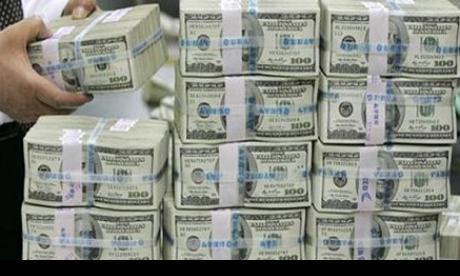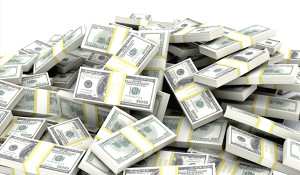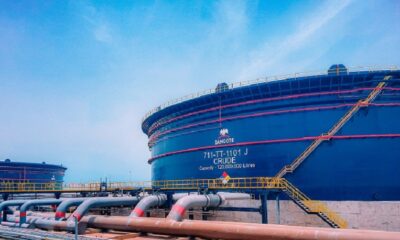Finance
CBN assures Dangote refinery of dollar supply despite forex decline

LAGOS — REFINERIES may have assumed a first-line charge in Nigeria as the Central Bank of Nigeria, CBN, said that it would assist the Dangote Group to access foreign exchange to facilitate its 14 billion dollar refinery project inspite of the current decline in foreign exchange been faced by the country.
Mr Godwin Emefiele, the Governor of the CBN, said this during a tour of the refinery which is projected to refine 650,000 barrels of crude oil per day.
The tour of the facility held on Sunday at its location within the Lekki Free Trade Zone in Lagos.
The CBN governor said that the support was to ease the importation of equipment needed to bring the Dangote refinery to reality.
 “Your ongoing 14 billion dollar refinery investment will enjoy our support, no doubt.
“Your ongoing 14 billion dollar refinery investment will enjoy our support, no doubt.
“We are doing this to fast-track the importation of equipment you need for a speedy completion of that project and to encourage other Nigerians to follow your lead,’’ Emefiele said.
According to him, the tour is necessary to lend our support to this laudable project that will transform Nigeria’s downstream oil sector.
“The Dangote Group approached us to indicate their interest to invest in refining crude, such that petrol-chemicals, fertiliser and fuel will be produced, about three years ago.
“Today, the three projects, which are valued at 14 billion dollars (N2.8 trillion), are on course and this is highly commendable, ‘’ he said.
Emefiele said the CBN would continue to support tremendous and impactful projects that would improve the socio-economic profile of the country through such investments.
He said the diversification of the Dangote Group was worthy of emulation by other industrialists.
“By the time this refinery is completed, it will not only service the needs of our domestic economy but shore up our international oil investments.
“Projects like this and our support will encourage more Nigerians to begin to think like the Dangote Group,’’ the CBN boss added.
Alhaji Aliko Dangote, Chairman, Dangote Group, said that the refinery would commence commercial operations at the early period of 2018.
“We are set to unveil the world’s largest refinery which will make Nigeria self-sufficient in petroleum products refining and also become a major exporter of oil.
“This project will mark a turning point in Nigeria’s search for local refining of crude oil.
“We will ensure the value chain in crude oil production is uplifted and other facilitators properly integrated into our scheme,’’ he said.
The chairman said that the fertiliser production aspect of the refinery would be completed by 2017.
Dangote said: “This project is generally about saving foreign exchange and earning more for our nation through the diversification of the economy.
“We started with local production of cement and today we export more than 12 tonnes of it.
“We don’t need dollars now to continue to produce Dangote Cement and that is the same thing we will do with this refinery.
”This refinery will have the capacity to serve this country optimally and it is part of our contribution in the vanguard to diversify our economy.’’
Business
Nigeria pays US$4.9 billion on petrol subsidy in 2024- NNPCL
It was however noted by Biztellers.com.ng, that although subsidy is back in effect, the main reason for that is the increasingly weak state of the Naira and the country’s extreme dependence on products importation. Also unlike the previous subsidy era, where several oil marketers were getting free subsidy refunds for unverified product importation, this subsidy era is witnessing only one importer, the NNPCL, which in effect is the sole receiver of government subsidies.
Yemie ADEOYE
INSPITE of the official position of the Nigerian government that the controversial petrol subsidy is gone for good as announced by the President on assumption of office, the state owned Nigerian National Petroleum Corporation Limited, NNPCL has disclosed that petrol subsidy is still fully operational in Nigeria, although, under a different identity.
Umar Ajiya, Chief Financial Officer at the NNPCL, disclosed that it cost the company a staggering N7.8 trillion (US$4.9) to cover this price gap in the first seven months of 2024.
Rather than simply referring to these claims as subsidies, he stated that the company is merely managing the price difference in petrol imports on behalf of the federation, stressing that this should not be misconstrued as a return to subsidy payments.
![]() This revelation has reignited discussions on whether the NNPC is indirectly offering subsidies, a concept typically defined as selling a product below its cost price.
This revelation has reignited discussions on whether the NNPC is indirectly offering subsidies, a concept typically defined as selling a product below its cost price.
Documents reviewed by Biztellers.com.ng showed that the term “subsidy” was used extensively in official correspondence between the NNPCL and the presidency, particularly in reference to the “shortfall.”
Recall that President Bola Tinubu reportedly approved NNPC’s request to utilize the 2023 final dividends due to the federation to offset these costs.
However, during a media briefing on Monday about the company’s 2023 audited financial statements, Ajiya refuted claims that the NNPC is involved in any subsidy scheme.
Ajiya further disclosed that the Nigerian government owes the NNPC N7.8 trillion ($4.9 billion) in subsidy-related debts for the period from January to July 2024.
In furtherance of his clarification to the News Agency of Nigeria (NAN), Ajiya insisted that no subsidy payments have been made to any marketer in the last nine years, citing the NNPC’s role as the sole importer of petrol under supply contracts.
He said, “In the last eight to nine years, NNPC Ltd. has not paid anyone a dime as a subsidy; no kobo has been disbursed by NNPC Ltd. in the name of subsidy. No marketer has received any payment from us for subsidy.”
“What has been happening is that we have been importing PMS, which has been landing at a specific cost price, and the government tells us to sell it at half price. So the difference between the landing price and that half price is a shortfall.
“And the deal is between the Federation and NNPC Ltd., to reconcile, sometimes they give us money, so there is no money exchanging hands with any marketer in the name of subsidy.”
Ajiya remained silent on how much of the $4.9 billion could have been remitted to the federation account if the NNPC had not been covering the “shortfall.”
It was however noted by Biztellers.com.ng, that although subsidy is back in effect, the main reason for that is the increasingly weak state of the Naira and the country’s extreme dependence on products importation. Also unlike the previous subsidy era, where several oil marketers were getting free subsidy refunds for unverified product importation, this subsidy era is witnessing only one importer, the NNPCL, which in effect is the sole receiver of government subsidies.
Banking
CBN Denies Currency Devaluation

The Central Bank of Nigeria (CBN) has refuted claims of devaluing the.
Earlier reports suggested that the CBN had devalued the Naira, lowering its exchange rate from N631 to the dollar, compared to the previous day’s rate of N461.60 at the Importers and Exporters (I&E) window.
However, the Central Bank of Nigeria (CBN) released a statement on Thursday through its Acting Head of Corporate Communications, Dr. Isa Abdulmumin, categorizing the report as false information.
In the statement titled ‘CBN Has Not Devalued The Naira’, he said the attention of the apex bank was drawn to the news report by an Abuja based newspaper edition of June 1, 2023, titled “CB Devalues Naira To 630/51”.
However, the CBN stated categorically that the news report was replete with outright FALSEHOODS and destabilizing innuendos, ‘reflecting potentially willful ignorance of the said medium as to the workings of the Nigerian Foreign Exchange Market.’
“For the avoidance of doubt, the exchange rate at the Investors’ & Exporters (I&E) window traded this morning (June 1, 2023) at N465/USS1 and has been stable around this rate for a while.
“The public is hereby advised to ignore the news report by Daily Trust in its entirety, as it is speculative and calculated at causing panic in the market,” the CBN spokesman added.
He, therefore, advised media practitioners to verify their facts from the Central Bank of Nigeria before publishing in order not to misinform the public.
Banking
BREAKING: CBN Increases Interest Rate By 0.5%

The interest rate in Nigeria has been raised to 18.5 percent, up by 0.5 percent, from 18 percent where it was pegged in March 2023.
The Central Banks of Nigeria’s (CBN) Monetary Policy Committee (MPC) resolved to this effect at its third meeting of 2023 in Abuja, on Wednesday.
Governor, CBN, Godwin Emefiele, made the disclosure in the communiqué of the MPC’s meeting, thereafter.
While engaging the media at the end of the two-day meeting, Emefiele, said the committee voted to keep the asymmetric corridor at +100 and -700 basis points around the MPR.
In the view of the MPC, rising inflation rate is traceable to the high energy cost and challenges around the supply chain, among others, which lie outside the corridors of the CBN.
Emefiele said, “The current trend in price development would continue to be monitored by the bank with greater collaboration with fiscal authority to address the drivers of inflation.”
Biztellers reports that the CBN had effected six consecutive interest rate increases, which has seen the rate move from 11.5 percent in March 2022 to 18.5 percent in May 2023.























